Contents
Gardeners value potatoes, not least for their good keeping quality, which is characteristic of many varieties and hybrids. However, this is not a guarantee that the crop will not deteriorate throughout the winter. Tubers need to be provided with optimal or close to optimal conditions, because potatoes freeze at a temperature slightly below zero if it lasts for several days. However, in some cases, the tubers affected by the cold are “not hopeless”: they are quite acceptable to eat.
Optimal storage conditions
Potatoes that freeze in storage are quite common. But the risk of damage can be minimized by providing it with optimal or close to these conditions and taking care of the constancy of parameters during the winter.
The list is quite short:
- lack of light;
- good ventilation (excluding cold drafts);
- a container that provides the possibility of air exchange;
- temperature 2-4 ° C;
- air humidity 75-80%.
Most often, potatoes spoil due to unsuitable temperatures. It can withstand a short change of 1-2 ° C in any direction, but with a strong deviation to the “minus” it freezes. At a higher temperature, the potato begins to germinate, quickly “wrinkles”.
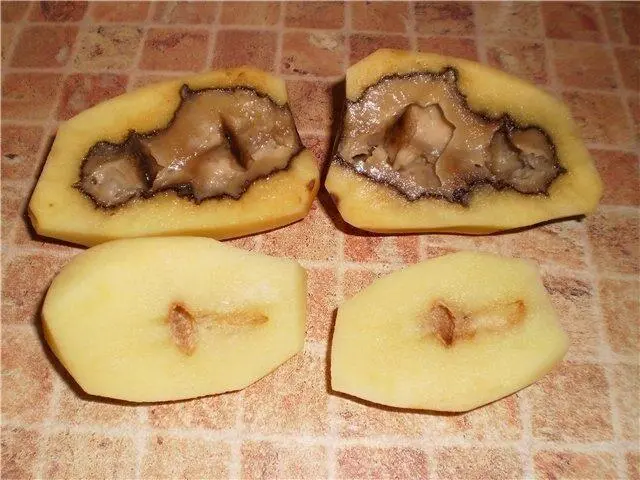
It is not enough to harvest a good potato crop – you need to be able to save it
How to tell if a potato is frozen
The first sign that the potatoes have begun to freeze during storage is the changed sound of tubers touching. When they fall asleep, they knock against each other loudly, and not deafly.
It is quite obvious that the potato becomes frozen if it is brought into heat. Already after 1-2 hours at room temperature:
- the peel is wrinkled, darkens, flabby, easily misses when pressed;
- tubers actively secrete watery juice both as a whole and when peeled, cut;
- the flesh on the cut turns brown or blackens.
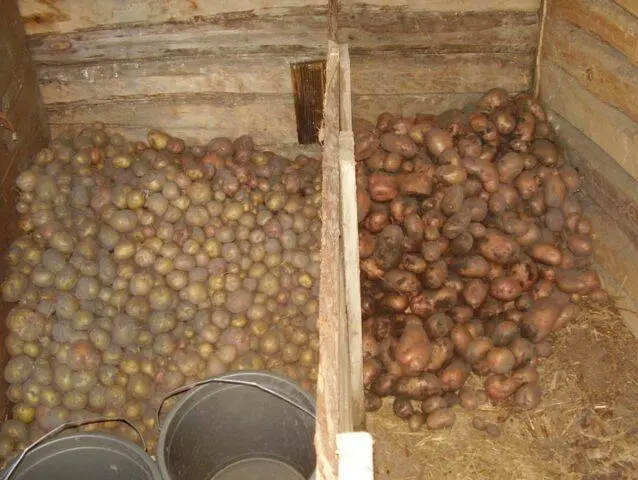
In fact, when frozen, the pulp decomposes due to developing rot.
At what degree do potatoes freeze
For potatoes, even small negative temperatures are detrimental with prolonged exposure to cold. But it must be borne in mind that, although it does not freeze instantly, individual negative processes begin already at 0 ° C. The liquid contained in the pulp turns into ice microcrystals, damaging tissues and dramatically accelerating the decomposition process.
At what temperature will potatoes freeze in the ground
Undug potatoes freeze in the garden only when the temperature of the substrate at the depth of the tubers drops to -1,7-3 °C. Accordingly, the first frosts at the end of summer or at the beginning of autumn, especially short ones, do not affect the quality of the crop. The soil at this time keeps the temperature at least 5-10 ° C higher, turning into a kind of “blanket”.
The substrate cools much longer than air. To critical values, the soil in a temperate climate freezes only by the end of November or the beginning of December, when not only the night, but also the daily minus temperature lasts for 3-4 weeks.
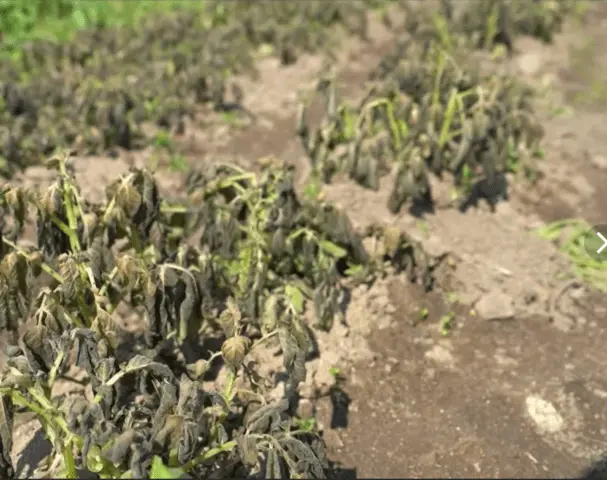
Regular loosening and mulching helps to keep warm in the soil longer.
At what temperature do potatoes freeze in the garage, in the barn
Creating optimal conditions for potatoes in a garage or barn is problematic. It cannot be kept in these rooms in severe frosts. Potatoes freeze when stored at a temperature of -1,7-3 ° C, and the indicators in a garage or barn and on the street differ by literally 2-3 ° C. Accordingly, it will deteriorate if the temperature outside is set at -4-5 ° C.
You can “delay the inevitable” a little so that the potatoes do not freeze in the garage or shed by covering them with old blankets, warm clothes, and so on. So another 2-3 °С “win”, but even for regions with a temperate, not to mention a more severe climate, this is not a panacea.
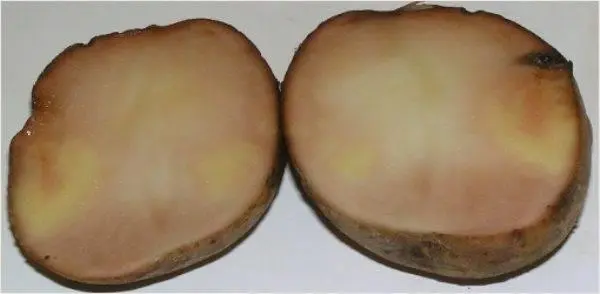
For winter storage, a garage and a barn are clearly not suitable.
At what temperature do potatoes freeze on the balcony
In the absence of glazing, this is also not an option for permanent storage in winter. Here it can be argued that the potatoes on the balcony froze as soon as the air temperature drops to -2-3 ° C, subject to additional insulation – up to -4-6 ° C.
On a glazed loggia, tubers can be stored at temperatures up to -8-10 ° C. To do this, they are put in cardboard boxes or wooden boxes, foam plastic, blankets, and old clothes are placed on top for additional thermal insulation.
But even here you cannot be sure whether the potatoes on the balcony will freeze. For example, high humidity negatively affects this.
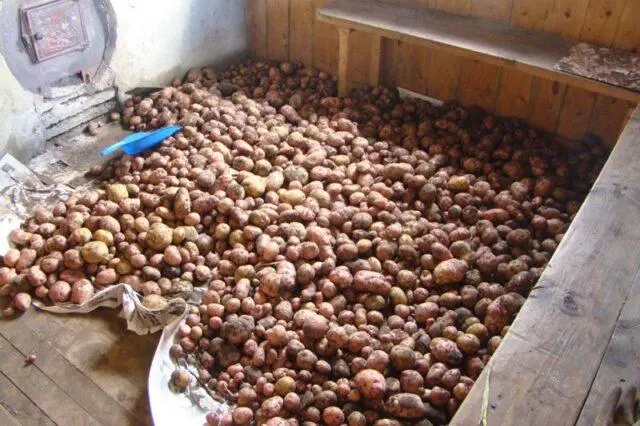
During the winter, tubers on the balcony can only be stored in a special “home” mini-cellar or boxes equipped with a heating system
At what temperature do potatoes freeze outside
A fairly common way to store potatoes is in a pit on the street. The minimum depth, which allows us to hope that it will not freeze in winter, is 1,5-2 m.
The walls and bottom must be properly insulated, a layer of mulch (dry grass, fallen leaves, straw, spruce branches) at least 35-40 cm thick is thrown on top. It is impossible to determine at what temperature the potatoes will freeze. The degree and rate of freezing of the substrate depends on its quality, friability, the presence and duration of thaws, and other factors.
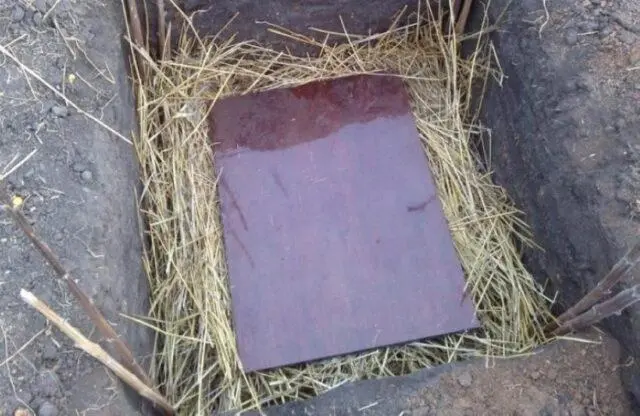
To preserve the consumer properties of tubers, it is necessary that they be below the freezing level of the soil to a temperature of -1,7-3 ° C
At what temperature do potatoes freeze in the cellar
The most suitable room for storing tubers, which allows you to largely be sure that the potatoes do not freeze during storage, is a cellar or basement. However, if the temperature in winter drops to -30 ° C or lower for a long time, it may turn out that the potatoes in the cellar are frozen. In extreme cold, it is advisable to store it in heated boxes – insulation in the form of foam, blankets, and so on will not be enough.
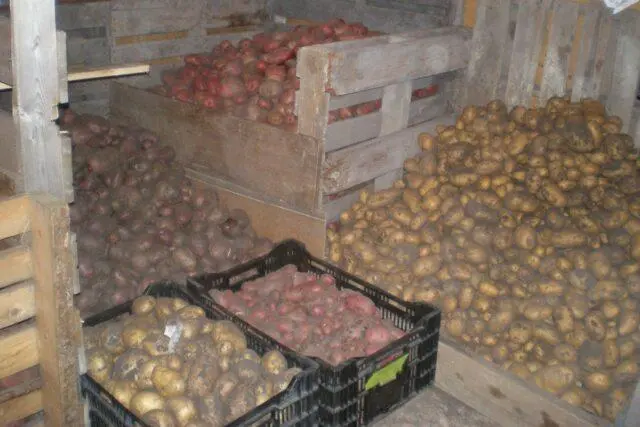
In the cellar, it is easiest to provide the desired temperature, humidity, and other parameters to prevent damage to the crop.
Can you eat frozen potatoes?
It is widely believed that, in a potato, when it freezes, substances harmful to human health are produced under the influence of negative temperatures. And, accordingly, after that it becomes unsuitable for food. However, this point of view is fundamentally wrong.
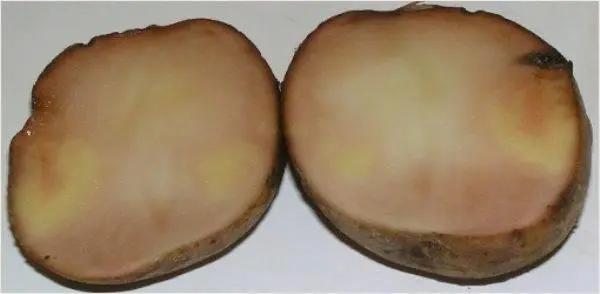
Cold provokes the breakdown of starch, in the process fructose and sucrose are released
Natural sugars are definitely not poisonous to humans: you can eat frozen potatoes, although, of course, the taste of the dishes will be specific. The only exceptions are specimens that have been severely affected by frost, in which the flesh has turned into black or dark brown mucus.
What to do if the potato is frozen
If it is suspected that the potatoes are freezing before harvest, the tubers must be dug up as quickly as possible. In any case, you can’t leave them in the garden – they begin to rot, massively “attracting” pathogenic microflora and insects.
The dug out tubers are left warm (15-18 ° C) for several days to determine the degree of damage. If their skin retains color and the flesh retains texture, they are storable, although keeping quality naturally suffers. Potatoes that freeze in the garden are kept separate from the rest of the crop and constantly monitored.
When the peel darkens significantly, it will not work to save the tubers, even for a short time. They need to be processed faster. And to make less pronounced the specific sweetish aftertaste that appears if the potato freezes, you can resort to one of the following methods:
- Leave the tubers warm for a longer time (7-14 days).
- For several hours, immerse the potatoes in hot (40-60 ° C) water. Then, when cleaning, cut off not only the peel, but also a layer of pulp 5-8 mm thick.
- Hold the peeled tubers for about an hour in cold water. After that, change it, add table vinegar (1 tablespoon per 2,5-3 liters), salt and boil until tender.
- Cook dishes from frozen potatoes, the recipe of which allows you to add spices and spices in large quantities or eat them with sauces

Frozen tubers are a suitable “raw material” for casseroles, meatballs, potato pancakes, dumplings, stuffing for dumplings
Where else do you use potatoes that freeze in the garden or during storage:
- for livestock feed;
- for the manufacture of starch;
- as a “raw material” for moonshine.
Storage advice
In order not to have to decide what to do with potatoes when it freezes, it is necessary to take into account in advance the recommendations regarding its preparation for storage and the process itself:
- Varieties and hybrids of medium-late or late ripening differ in much greater keeping quality. They also demonstrate better cold resistance, less often freeze in the garden and during storage.
- During early autumn frosts, the “heavy” substrate (clay, peat, silt) freezes most quickly. The situation is even aggravated when the beds are located in a lowland or at the foot. Accordingly, such areas are least suitable for planting tubers. Also, the experience of gardeners shows that potatoes freeze more often during storage if the summer was very rainy.
- The fastest process of starch breakdown in tubers that freeze occurs if they have an excess of nitrogen combined with a deficiency of potassium. Therefore, it is important to apply the right fertilizers in a timely manner.
- You can not immediately lay the potatoes for storage and wash before that. Its drying for 5-7 days at a temperature of 13-18 ° C contributes to the “coarseness” of the skin, which becomes an additional protection from the cold. A similar effect is obtained by mowing the tops about 1,5-2 weeks before digging up the tubers.
- To prevent the potatoes from freezing during storage, it is recommended to reduce the temperature gradually, over a period of about two weeks. This is necessary for the gradual “slowdown” of any biochemical and physiological processes, the potato becomes less susceptible to cold and temperature extremes.
- Any diseases adversely affect the keeping quality and frost resistance of tubers. To reduce the risk of mold, rot, and other pathogenic microflora, the room intended for storing potatoes is pre-disinfected and dried.
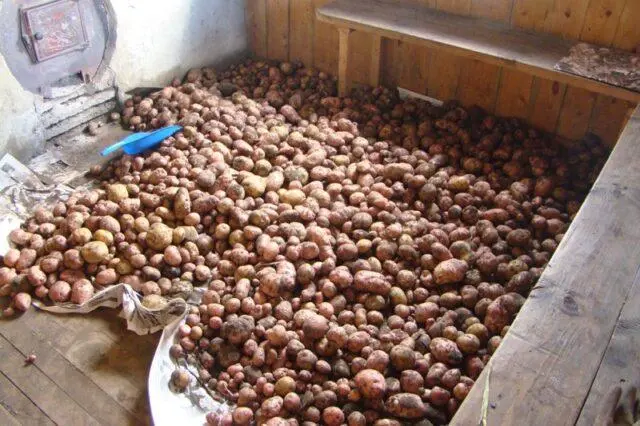
Preparing for storage is as important as optimal winter conditions
Conclusion
Potatoes freeze at a temperature slightly below zero, so without creating and maintaining optimal conditions at the storage site, it is impossible to preserve the crop through the winter. However, in some cases, cold-exposed tubers can still be “saved”.










